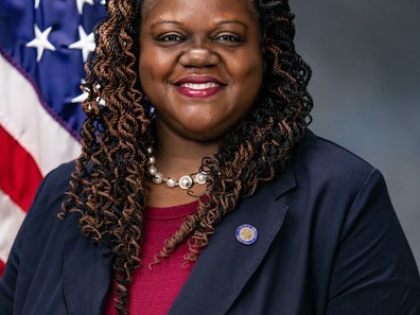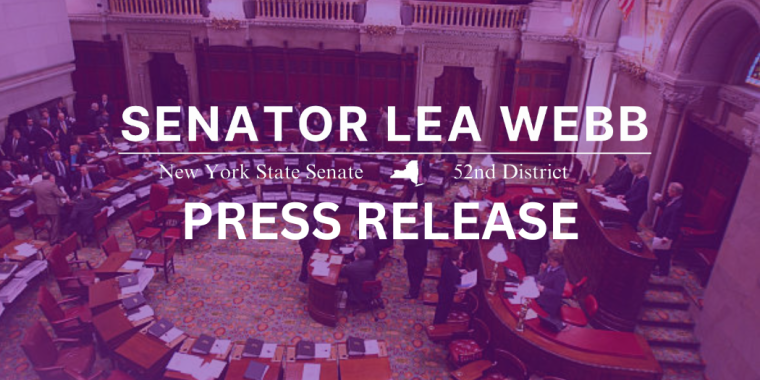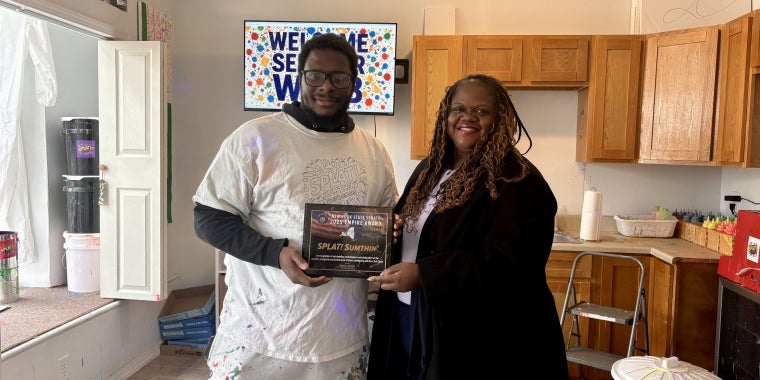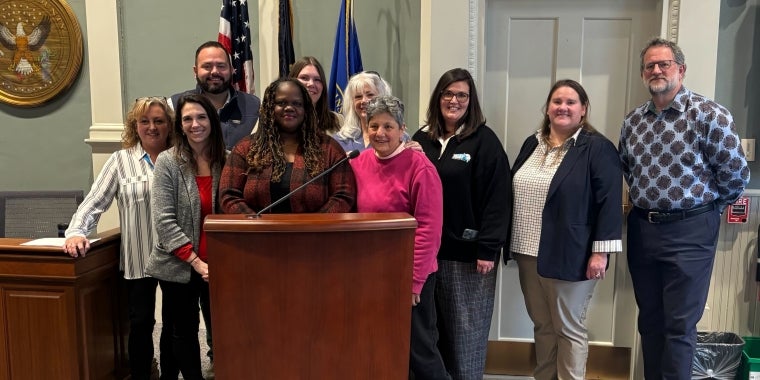
Senator Webb and the New York State Senate Majority Announces One-House Budget to Boost Affordability and Prosperity for Working-Class New Yorkers
March 12, 2024

(Binghamton, NY) Senator Webb and the New York State Senate Majority have released their ambitious One-House Budget, an important step towards achieving a final budget that will make New York more affordable and prosperous for its working individuals and families. The comprehensive budget plan also outlines Senator Webb and the Senate Majority’s priorities on critical issues, from restoring public education funding, advancing New York’s climate change fight, delivering housing reforms, providing resources for family farms and creating the local jobs of the future.
“The Senate’s one-house budget proposal includes significant investments for our community,” said Senator Lea Webb. “I am proud of the work we have done to deliver a budget resolution that centers the needs of New Yorkers in equitable ways especially in our most vulnerable communities. Our Senate one-house budget proposal addresses this moment by focusing on critical issues, from restoring public education funding, advancing New York’s climate change fight, delivering housing reforms, expanding childcare, providing resources for family farms and creating the local jobs of the future. These priorities and others are supporting our working families, infrastructure, and small businesses here in the Southern Tier. As our negotiations continue, I will keep fighting to ensure that our priorities are included in the final State Budget.”
Highlights in the Senate Majority’s One-House Budget Resolution include:
Restoration of Public Education Funding and Supporting SUNY/CUNY
In a signal for students and educators across the state, the Senate Majority has taken decisive action to restore drastic cuts to public education.
- Rejects all Executive changes to Foundation Aid, including the elimination of “hold harmless.”
- $150 million for Universal Pre-K.
- $747 million for school aid, providing a minimum 3 percent increase for all school districts.
- $5 million to combat anti-semitism, islamophobia, and anti-Asian hate in schools.
- Reform the Universal Prekindergarten Program by increasing the overall and per pupil funding for prekindergarten, expand the UPK program, and direct SED to conduct a study to provide recommendations on the consolidation of UPK funding streams and programs.
- Reform the TAP program by raising the maximum income threshold for TAP eligibility from $80,000 to $125,000, increasing the minimum TAP award from $500 to $1000, increasing the maximum TAP award from $5,665 to $6,165, and to end differential treatment for dependent and independent students.
- Advance language to apply TAP to additional part-time students at for-profit colleges.
Revitalizing Housing for All New Yorkers
The Senate Majority's One-House Budget Resolution focuses on addressing the housing crisis in New York. Understanding the critical need for affordable, safe, and secure housing, the budget outlines significant investments and reforms aimed at increasing the availability of affordable homes, supporting tenants, and stimulating responsible development across the state.
- New York Housing Opportunity Corporation “Mitchell-Lama 2.0”: The Senate puts forward a new program entitled the New York Housing Opportunity Corporation, using the $250 million allocated as a part of the NY RUSH program, to expedite and build more long-term affordable housing on available state-owned land throughout NY, as a successor to the Mitchell-Lama program..
- Protecting Tenants and Homeowners:
- Tenant protections that align with the core principles of Good Cause Eviction.
- Protecting New Yorkers against Deed Theft
- $5 million for the Office of Civil Representation- as a part of a civil right to representation by counsel for individuals at risk of losing their housing accommodation.
- $250 Million for the Housing Access Voucher Program - would provide rental assistance in the form of vouchers to individuals who are homeless or facing imminent risk of becoming homeless.
- $40 million for the Homeowner Protection Program
- $20 million for Legal Service Representation for Evictions in NYC.
- $40 Million for Legal Service Representation for Evictions outside NYC.
- $50 Million to increase public assistance access and support for individuals at risk of eviction to keep them in their homes.
- Increasing and Preserving Supply:
- Providing the City of New York the authority to override the FAR cap.
- Commercial conversions with more emphasis on affordability.
- Creates an optional multifamily tax exemption for new construction and commercial conversions in municipalities outside of New York City.
- Creates an optional incentive program for municipalities to legalize accessory dwelling units, to create an optional tax exemption for homeowners to create accessory dwelling units, and to create a state-level financing for accessory dwelling units.
- Openness for further discussion on extending the 421-a construction completion deadline for vested projects, as well as the creation of a tax exemption for the construction of multi-family rental housing to replace the expired 421-a program.
- $500 million for preservation and repairs for the New York City Public Housing Authority (NYCHA)
- $140 million for Public Housing Authorities outside the City of New York.
- $50 million for Land Banks and Land Trusts across the state
- $40 million for the construction of small infill homes in Buffalo, Albany, Syracuse, Rochester, and Binghamton (S.8585-A)
- $40 million to provide grants for owners of five or fewer units to bring dilapidated apartments up to code as affordable rentals throughout the state outside of New York City (S.8591)
- $40 million to offer grants to repair vacant rent-stabilized apartments in New York City, as well as Nassau, Westchester, and Rockland counties.
- $25 million for the repair and rehabilitation of affordable rural housing
- $12 million for the Small Rental Development Initiative.
Supporting Working Families and Fighting New York’s Affordability Crisis
The Senate Majority’s One-House Budget Resolution introduces significant measures to improve the affordability of living and working in New York.
- Creating a Working Families Tax Credit that would provide a $550 credit per child to single taxpayers making under $75,000 and married taxpayers filing jointly making $130,000. This would replace the existing Empire State Child Credit, providing a more generous credit.
- Extending the real property tax relief credit for middle income homeowners for three years and expanding eligibility.
- Investing in Child Care:
- $220 million in additional support for the establishment of a permanent Workforce Retention Grant program, for a total of $500 million. Funds will provide child care employees with an annual salary enhancement.
- S08152- Amends the requirements related to the eligibility of child care assistance to provide that applicants who meet the eligibility criteria for child care assistance via the block grant for child care shall be eligible for a full-time child care slot regardless of the hours the child’s caretaker is working or the reason the caretaker requires child care.
- The Senate advances language to establish differential payment rates from ten to fifteen percent for child care providers who provide care to children experiencing homelessness, who provide care during nontraditional hours, or who provide care in circumstances deemed appropriate by the local district.
- $50 million to establish the NYS SNAP Minimum-Benefits program, ensuring families who need it receive a minimum benefit of $50 per month.
- $45 million for the MTA’s Fare-Free Bus Pilot to support three additional bus routes per borough.
- $135 Million Making free meals at New York Schools 100% universal under the National School Lunch and Breakfast Program.
Spurring Economic Growth and Growing New York Small Businesses
The Senate Majority’s one-house budget resolution continues to display our commitment to helping small businesses thrive across New York State with the creation of multiple tax credits and investments. In addition, the Senate is advancing language to assist cannabis farmers whose crops were impacted by the delayed implementation of the cannabis program.
- Working Opportunities Tax Credit: The Senate advances language creating a state version of the working opportunities tax credit, capped at $5 million.
- Journalism Tax Credit: The Senate advances language creating a payroll tax credit for independently owned media entities employing new journalists with 100 or fewer employees, capped at $20 million annually.
- Accepting the Retail Security Tax Credit to assist small businesses and keep employees safe.
- Establishes a retail crime task force to support and assist localities with retail theft incidents.
- $1 million for beginning farmers
- Adding $1.2 million for the MWBE Utilization Monitor Program, and expanding the MWBE Lending Program by an additional $1.4 million.
- Supporting New York’s Legal Cannabis Market:
- $60 million for Cannabis farmer loans.
- $40 million for grants through a newly created Cannabis Farmer Relief Fund.
- $28 million for Cannabis farmer refundable tax credits to help offset losses.
- Modifies the Executive proposal to repeal and replace the cannabis potency tax, with language which phases in a permanent rate for the new wholesale tax over a multi-year period.
- Repeal the excise tax on medical cannabis.
Commitment to New York’s Environmental and Climate Goals
Upholding its commitment to a sustainable future, the Senate Majority’s budget prioritizes New York’s aggressive climate goals.
- Restoring $250 million for the Clean Water Infrastructure Act with $15 million dedicated to Per- and Polyfluoroalkyl Substances (PFAS) and including an additional $100 million for the Safe Water Infrastructure Program.
- Reversing cuts to the Environmental Protection Fund.
- Adding the NY HEAT Act (S.2016-B), which aligns state law, oversight, and regulations of gas utilities with the CLCPA’s emissions reduction mandates while removing the 100 foot rule for gas connections. Sets the affordability goal for the Public Service Commission that energy burdens shall not exceed six percent of any household income.
- Adding the Climate Superfund Act (S.2129-A), which establishes a climate change cost recovery program to require large fossil fuel companies that have contributed significantly to the buildup of greenhouse gasses in the atmosphere to remit payments to the State based on greenhouse gas contributions, and directs the proceeds to be used for climate change adaptation expenditures.
- The Senate also advances language removing various tax breaks for the use of fossil fuels and dedicates revenues from the taxation of aviation fuel back to airport capital and operating expenses (based on S.3389).
- Establishes an Office of Flooding Prevention and Mitigation to assist localities with responding to and mitigating severe storms, based off of S.3335-A.
- Increases the maximum tax credits for solar and geothermal home installation from $5,000 to $10,000, as well as allowing for their usage on storage.
- Modifies the RAPID Act to expedite siting and construction of electrical transmission and commercial energy storage along with provisions for preserving prime agricultural land and including greater community input in the siting process.
Supporting Reproductive and Maternal Health
Recognizing the critical importance of reproductive and maternal health in overall community well-being, the Senate Majority’s budget continues to address these needs.
- Advances the Reproductive Freedom and Equity Grant for $25 Million
- Advances $10 Million to support an increased medicaid reimbursement rate for abortion medication.
- Increases the paid break time for breast milk expression from 20 minutes to 30 minutes, an additional ten minutes compared to the Executive Budget proposal.
- Advances the 40 hours of paid family leave for employees to use on prenatal health, but changes the leave provided from paid family leave to personal leave
- Advances $12 million for the Mothers and Infants Lasting Change Allowance (MILC), a pilot program that will provide 1,000 new mothers a cash allowance during the final three months of pregnancy which will continue until the child born of that pregnancy reaches 9 months of age.
- Advances $250,000 establishing a Community Doula Expansion Grant Program (S.7779B).
Investing in Mental Health Services and Access to Quality and Affordable Healthcare
The Senate Majority addresses the pressing need for improved mental health services and access to quality and affordable services across the state.
- The Senate supports a $4 billion increase in State revenue derived from a tax on managed care companies to support investments in health care.
- The Senate adds $1 billion to restore funding for the State Medicaid program, which includes funding for Hospitals, Health Homes, Nursing Homes, and Mainstream/Managed Long-Term Care Quality Pool.
- The Senate rejects the Governor’s changes to the Consumer Directed Personal Assistance Program (CDPAP).
- The Senate adds $1.5 billion in Capital funding for Healthcare Facility Transformation projects.
- The Senate adds $1.6 billion for Medicaid reimbursement rates increase; three percent across-the-board (ATB) rate increase, an additional 6.5 percent for Nursing Homes (NHs), Assisted Living Providers (ALP), and Hospice services, an additional seven percent for Inpatient & Outpatient Hospital services, which support the following:
- 10 percent total rate increase for Hospitals (3% ATB + 7%)
- 9.5 percent total rate increase for NHs, ALPs and Hospices (3% ATB + 6.5%)
- The Senate adds $600 million for Financially Distressed Hospitals, for a total of $1.9 billion State-share.
- The Senate adds $2 million for Daniel’s Law Pilot Crisis Intervention Program grants.
- The Senate advances language to create a youth telehealth mental health services program (S.8146).
- The Senate advances language to rebase nursing homes (S.6914), assisted living programs (S.7248), and federally qualified healthcare centers reimbursement rates (S.6959).
- The Senate advances language to reform practices and standards for the adjustment or recovery of medical assistance payments by the Office of the Medicaid Inspector General (S.5329-C).
Investing in Local Communities by Funding Local Government and Critical Infrastructure
As the lifeblood of our neighborhoods, local governments play a pivotal role in addressing unique challenges, delivering essential services, and fostering economic development. By allocating resources to support local governments, the state not only invests in the vitality of individual communities but also strengthens the entire fabric of New York.
- $79.6 million in additional support for Statewide Transportation Operating Assistance funding
- $45 million for the MTA to increase bus service frequency
- $160 million in additional support for the Consolidated Local Highway Improvement Program (CHIPS), for a total of $698.1 million.
- Advancing the FARES Act, which adopts various public transportation discounts:
- Expanding Fair Fares to the commuter rails within New York City and requiring improved public outreach on the program.
- Funding a weekly CityTicket, including transfers to subways and buses.
- Providing AM peak fare discounts to seniors and individuals with disabilities across the MTA commuter rail system.
- Modifies the $300 million ConnectALL appropriation by adding a $72 million carveout to support free broadband internet and wifi access to residents in temporary housing facilities.
- Adding $210 million for Aid and Incentives for Municipalities (AIM), again considering the City of New York in the formula, and reevaluating the AIM program with an AIM Redesign Task Force.
- Funds $25 million for Volunteer Firefighter Capital Grants.
- Supporting EMS with Senator Shelley Mayer’s S.4020-C, which declares general ambulance services as an essential service, establishes special districts for the financing and operation of general ambulance services, and provides for a statewide comprehensive emergency medical system plan.
- Advancing Sammy’s Law (S.2422-B) to give New York City the ability to reduce its speed limits and make further progress combatting traffic fatalities.
- Improving quality of life by cracking down on illegal commercial truck parking, and going after “vanish” plates and fraudulent paper license plates through comprehensive parking reforms and the Toll Payer Protection Act.
Upholding Workers Interests and Well-Being
The Senate Majority takes necessary actions to better support Labor and workers across New York State to ensure they can retire with dignity, support their families and have a safe and positive workplace.
- Reforming Tier 6 by advancing language to reduce the final average salary calculation window for Tier 6 members from five to three years (S.8490).
- The Senate modifies the Executive proposal by increasing the Cost of Living Adjustment (COLA) increases for all “O” Agencies to 3.2 percent, including titles previously excluded from the COLA and directing the funds for direct salary support.
- The Senate adds $190 million to support wage enhancements of $2,000 for Direct Service Providers (DSPs) making up to $75,000.
- Establishes a stronger Temporary Disability Insurance program by implementing a progressive benefit structure over a three-year period and amends employee contributions provided that in no case shall employee contributions exceed $2.20 per week.
- Advancing language to reduce the period from which striking workers are eligible to receive unemployment insurance benefits as a result of a labor dispute from two weeks to one week (S.4402).
- Advancing language to require the Workers' Compensation Board to allow claims related to work-related stress for all workers.
- Modifying the Executive proposal to expand recovery tools for stolen wages to allow workers to seek an order of attachment against defendants on wage theft claims and to allow workers to hold shareholders of non-publicly traded corporations personally liable for wage theft (S.7539) and to establish a dedicated, recurring revenue stream for Department of Labor wage enforcement purposes by utilizing resources the agency recovers from penalties imposed on employers found in violation of wage theft provisions of the labor law (S.7818).
- Advancing language to make clarifying changes to the labor standards required for renewable energy system projects to ensure prevailing wage standards and labor peace agreements are implemented.
A Comprehensive Approach to Statewide Progress
Beyond these key areas, the Senate Majority’s budget takes a holistic approach to statewide prosperity, addressing various sectors and needs to ensure a safe and brighter future for every New Yorker.
- Advancing the Grieving Families Act (S74A) to permit the families of wrongful death victims to recover compensation for their emotional anguish.
- Advancing language to require the State Board of Elections to join the Electronic Registration Information Center (ERIC), a multistate voter list maintenance organization.
- $5 million for the John D. Flateau Voting Rights Act Database
- Providing $10 million for local Boards of Elections for staffing needs
- Empowering local governments to crackdown on illegal cannabis shops.
- $8.3 million for the Dwyer Peer to Peer Veterans Program.
- Advancing language that enacts the ‘Challenging Wrongful Convictions Act’ which would expand the grounds under which a motion to vacate judgment may be filed (S.7548).
- The Senate proposes $30 million for Asian American and Pacific Islander crisis intervention initiatives and community based programs combating bias crimes.
- Advancing language to add strict safeguards and legislative oversight for governmental use of artificial intelligence tools (S.7543-A)
- Advancing language to establish a comprehensive scheme for securing online privacy rights for all consumers by regulating collection, processing and sale of personal data by businesses (S.365-B), including heightened restrictions on use and sale of data of minors (S.7695).
###
Share this Article or Press Release
Newsroom
Go to Newsroom


